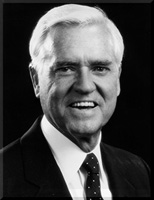
Sen. Hollings
Clinton Administration Opposes Y2K Litigation Reform Bill
(April 29, 1999) The Executive Office of the President wrote an unsigned statement dated April 27, 1999 suggesting that President Clinton might veto S 96, the Y2K Act. The Senate is debating the bill to reform liability and procedural rules for litigation arising out of Year 2000 technology problems.
| Related Pages |
| Administration statement threatening veto, 4/27/99. |
| S 96, McCain-Wyden Substitute Amendment. |
| Tech Law Journal Summary of Y2K Bills. |
The letter does not state that S 96 will be vetoed. It states that if S 96, as approved by the Senate Commerce Committee, or as embodied in the "McCain-Wyden" version, is passed, the Attorney General would recommend a veto. Nevertheless, opponents of the bill, such as Minority Leader Tom Daschle (D-SC), cited the statement during floor debate as a reason for rejecting the McCain-Wyden bill.
The statement is unsigned. It is printed on letterhead of the Executive Office of the President. Moreover, the White House Press Office refused to disclose to Tech Law Journal any information about the statement, including its existence.
The Senate Commerce Committee approved the bill on a straight party line vote on March 3, 1999. Last week, Sen. McCain, Sen. Ron Wyden (D-OR), and other members of the committee announced that an agreement had been reached on a revised version of the bill. They announced that the "McCain-Wyden" version would be offered as a substitute amendment during consideration of S 96 by the full Senate.
The Senate began debate on S 96 this week. The Senate has not yet voted on the bill, or any amendments, because of procedural roadblocks set up by opponents of the bill.
The Clinton administration statement begins:
"The Administration strongly opposes S. 96 as reported by the Commerce Committee, as well as the amendment intended to be proposed by Senators McCain and Wyden as a substitute. If S. 96 were presented to the President, either as reported or in the form of the proposed McCain-Wyden amendment, the Attorney General would recommend a veto. The Administration, however, understands that Senators Kerry and Robb and others are working on an amendment in the nature of a substitute that would address its primary concerns and which the Administration can support."
The administration statement cited as objections the punitive damages cap, the limitations on the availability of joint and several liability, and the federalization of Y2K class actions. The statement argued because of these provisions the bill would "not enhance readiness and may, in fact, decrease the incentives organizations have to be ready and assist customers and business partners to be ready for the transition to the next century."
 |
Sen. Hollings |
Sen. Ernest Hollings (D-SC) is leading the opposition to the bill. Sen. Hollings is also the Ranking Minority Member of the Senate Commerce Committee. During floor debate on Wednesday, April 28, he stated that the bill "makes a good disincentive to produce a Y2K compliant product." He also dismissed projections that Y2K litigation could cost over one trillion dollars as "chicken licken, the sky is fallen."
Freshman Sen. John Edwards (D-NC) also offered his objections to the bill during floor debate on Wednesday. He argued that there is no urgency because "this Y2K problem has been around for forty years." Two of his main objections to the bill are that it would eliminate joint and several liability in most situations, and it would create federal jurisdiction over Y2K cases.
"First of all, all of the cases are going to go to the federal courts," said Edwards. "They are already overburdened."
"This bill essentially eliminates joint and several liability." He concluded that the McCain-Wyden amendment is an "extremist version of a bill that takes away rights of an innocent party."
He stated that he did not object to either "alternative dispute resolution" or "a cooling off period."
Sen. Edwards was a trial lawyer before his election to the Senate last fall.
The Senate is scheduled to resume debate on S 96 on Thursday morning, April 29.